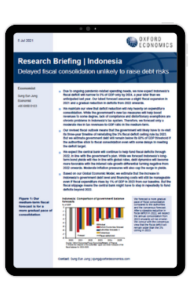Indonesia | Delayed fiscal consolidation unlikely to raise debt risks

Due to ongoing pandemic-related spending needs, we now expect Indonesia’s fiscal deficit will narrow to 3% of GDP only by 2024, a year later than we anticipated last year. Our latest forecast assumes a slight fiscal expansion in 2021 and a gradual reduction in deficits from 2022 onwards.
What you will learn:
- Deficit reduction will rely heavily on expenditure
consolidation. While the government’s new tax measures will help boost revenues to some degree, lack of compliance and distortionary exemptions are chronic problems in Indonesia’s tax system. Therefore, we forecast only a moderate rise in tax revenues-to-GDP ratio in the medium-term. - The government will likely have to re-visit its three-year timeline of reinstating the 3% fiscal deficit ceiling rule by 2023. But we estimate government debt will remain below its 60% of GDP threshold if the authorities stick to fiscal consolidation even with some delays in meeting the deficit target.
- We expect the central bank will continue to help fund fiscal deficits through 2022, in line with the government’s plan. While we forecast Indonesia’s longterm bond yields will rise in line with global rates, debt dynamics will become more favorable with the interest rate-growth differential turning negative from 2022 onwards.
Tags:
Related Services

Post
UK: Supply constraints are probably less prominent in the south
The extent to which UK employers can respond to likely 2024 interest rate cuts with increased output, rather than rises in prices and wages, will partly reflect the extent of spare capacity. This will inevitably vary by region. Evidence on this is imperfect, but in terms of capital assets (including intangibles) and labour availability, southern regions appear to be in a stronger position than those in the UK's traditional industrial heartland.
Find Out More
Post
Global Private equity real estate fund maturities spur asset sales
We expect the significant increases in fund maturities, spurred by capital raised over the past decade, to exert upward pressure on the rate of asset disposals as the funds approach the end of their lifecycles.
Find Out More